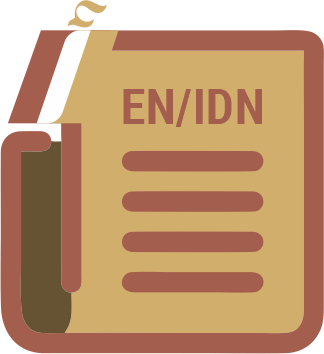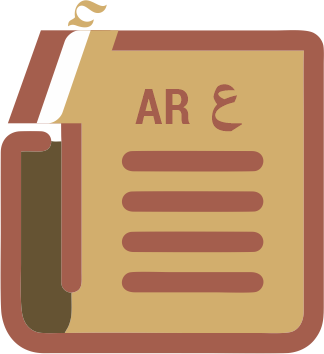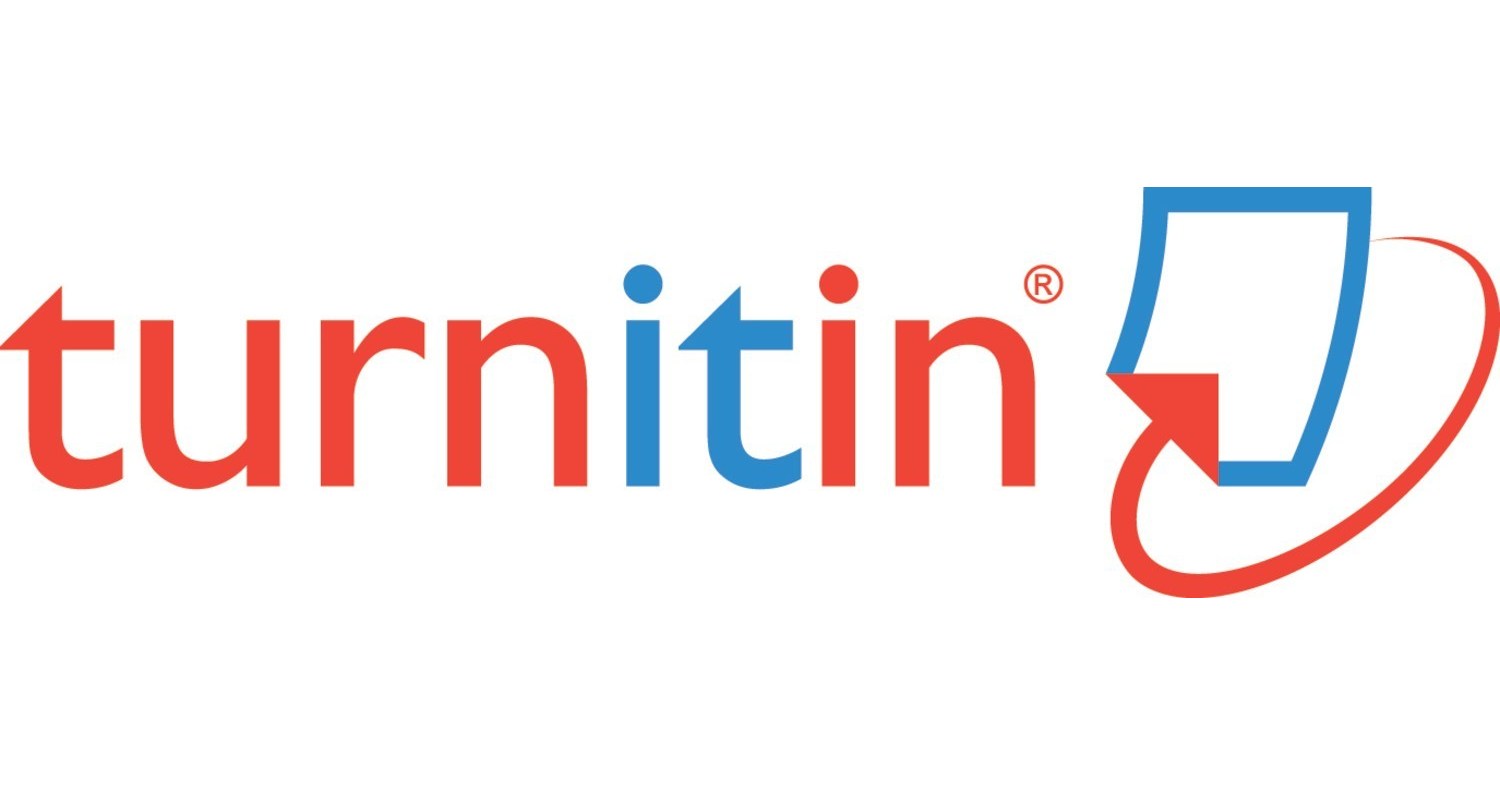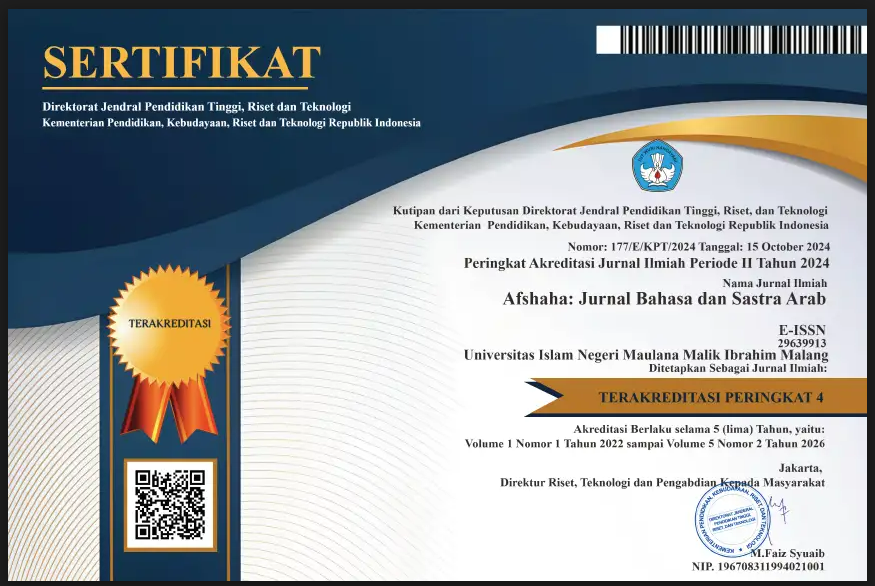- Focus and Scope
- Section Policies
- Peer Review Process
- Open Access Policy
- Archiving
- Plagiarism Policy
- Article Processing Charges
Focus and Scope
Afshaha: Jurnal Bahasa dan Sastra Arab emphasizes the study of Arabic language and literature across various regions, with particular attention to Islamic countries. The journal focuses on both theoretical and practical aspects of Arabic linguistics and literary studies, presented through scholarly articles and critical book reviews.
The journal aims to highlight original research and current issues in the theory and practice of Arabic language and literature worldwide. It warmly welcomes contributions from scholars in related disciplines, especially in the fields of, but not limited to:
- semantics
- semiotics
- pragmatics
- lexicology
- lexicography
- literary studies, such as literary history, theories, and criticism.
Section Policies
Articles
Peer Review Process
Afshaha: Jurnal Bahasa dan Sastra Arab operates a double-blind peer review process to ensure objectivity and academic integrity. The journal receives more submissions than can be published and relies on evaluations by subject matter experts from various universities in different countries to select high-quality manuscripts.
General Review Criteria
Manuscripts submitted to this journal should meet the general criteria:
- Provides strong evidence for its conclusions
- Should be a research result or literature study in the language and literature field
- Ideally interesting to researchers in the language and literature field and other related disciplines.
- It must fulfil scientific merit and novelty or new contribution to knowledge to the focus and scope of this study
- Written in English or Arabic language
- Follow the Focus & Scope and Author Guidelines
The paper submitted to the journal must be original, unpublished work and not under consideration for publication elsewhere. Every paper submitted will be scanned for plagiarism before it is sent to the reviewer (maximum similarity of 15%).
Review Process
Manuscripts are scrutinized for structure, organization, correctness, clarity of language and compliance with the Author's Guidelines. Typographical, grammatical, content clarity and format compliance of manuscripts are the author's responsibility(s). Manuscripts not meeting these conditions will be returned to the authors.
When a manuscript has passed the editorial office review process, it is subjected to a double-blind review system. At least two external reviewers are chosen from the database of this journal, the journal's editorial board, or other sources. These reviewers are subject matter experts in the field. Invitations to review are sent to the reviewers with attached abstracts. A double-blind peer review technique is used by this journal, an anonymous peer review system in which the identity of the manuscript's author(s) is kept hidden from the reviewers. Before a manuscript is given to a reviewer, details that could reveal to a reviewer of author(s)'s identity in the manuscript would be erased. When sending the reviewers' comments to the author(s), the reviewers' identities are likewise hidden from the author(s). Because it limits possible bias from either the selected reviewers or the authors, this journal deems the double-blind peer system a more effective review system.
Reviewers are expected to assess the manuscripts and provide helpful feedback so that the author(s) can improve the quality of the manuscript. The manuscript is also judged on its originality, contribution, technical excellence, presentation clarity, and research depth.
Reviewer Recommendations
Finally, reviewers provide one of the following recommendations:
- Accept "as it is."
- Requires minor corrections
- Requires major revisions
- Reject. In this case, the reviewer provides the specific reason(s) why the manuscript is not further processed.
In general, to be acceptable, a paper should represent an advance in understanding likely to influence thinking in the field. There should be a discernible reason why the work deserves the visibility of publication in Afshaha: Jurnal Bahasa dan Sastra Arab Journal rather than the best of the specialist journals.
The final decision of manuscript acceptance is solely made by Editor in Chief and/or Associate Editor (together with Editorial Board, if required) according to reviewers' critical comments. Publication of accepted articles, including assigning the article to the published issues, will be made by Editor in Chief by considering the sequence of accepted dates and geographical distribution of authors as well as a thematic issue.
Open Access Policy
This journal provides immediate access to its content on the principle that making research freely available to the public supports a greater global exchange of knowledge.
All articles published in Open Access will be immediately and permanently free for everyone to read and download. We continuously work with our author communities to select the best choice of license options; currently being defined for this journal is: Creative Commons Attribution-ShareAlike (CC BY-SA 4.0).
This is a human-readable summary (not a substitute) of the full license. You are free to:
- Share — copy and redistribute the material in any medium or format.
- Adapt — remix, transform, and build upon the material for any commercial purpose.
The licensor cannot revoke these freedoms as long as you follow the license terms. Under the following terms:
- Attribution — You must give appropriate credit, provide a link to the license, and indicate if changes were made.
- ShareAlike — If you remix, transform, or build upon the material, you must distribute your contributions under the same license as the original.
- No additional restrictions — You may not apply legal terms or technological measures that legally restrict others from doing anything the license permits.
Archiving
This journal utilizes the LOCKSS system to create a distributed archiving system among participating libraries and permits those libraries to create permanent archives of the journal for purposes of preservation and restoration. More...
The LOCKSS Publisher Manifest page is available at: https://ejournal.uin-malang.ac.id/index.php/afshaha/gateway/lockss
Plagiarism Policy
Screening Plagiarism Policy
All articles submitted to Afshaha: Jurnal Bahasa dan Sastra Arab will be screened for plagiarism using Turnitin (maximum similarity of 15%).
Authors are strongly encouraged to check the originality of their manuscripts before submission, using reliable similarity detection tools to avoid potential issues during the editorial process.
Article Processing Charges
Afshaha: Jurnal Bahasa dan Sastra Arab charges an article processing charges (APC) of IDR 400,000 for each accepted manuscript. This fee covers the costs of editorial processes, peer review, typesetting, and online publication. The APC is only payable after the manuscript has been accepted for publication, and there are no additional fees for submission or other stages of the editorial process.











